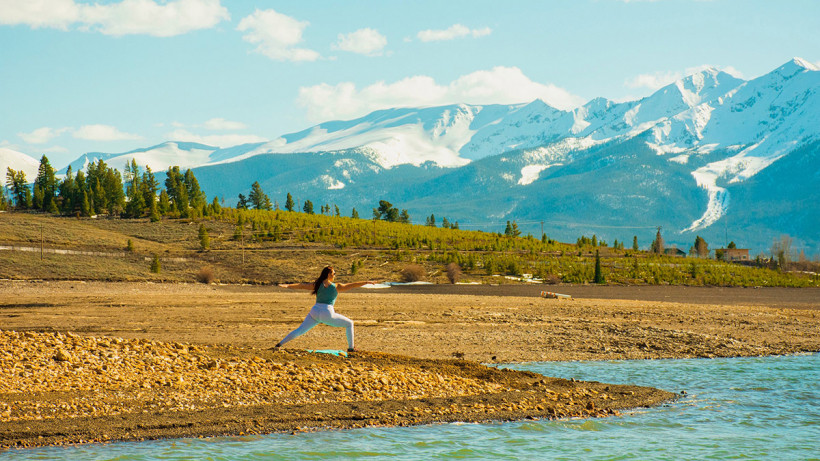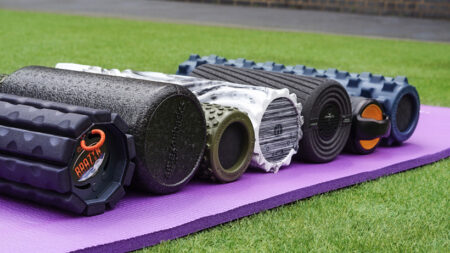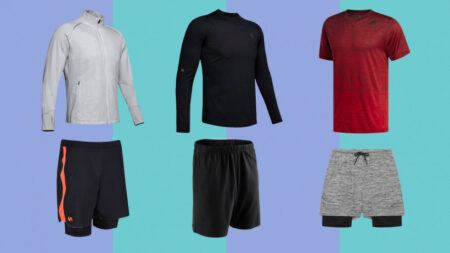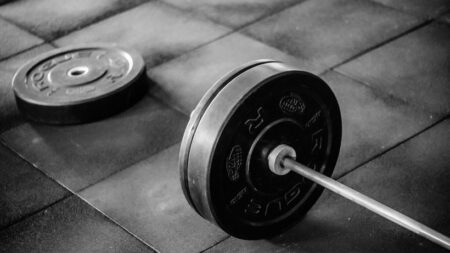Fitness and outdoor kit that's as good for the planet as it is for your training
Sustainability has never been a hotter topic than it is right now. Thanks to Blue Planet, Extinction Rebellion and Greta Thunberg, we’re more aware than ever before of the state our planet is in. It’s only logical that the national conversation has turned to what we can do to help, and that includes our buying habits.
The last few years have seen an uptick in fast fashion activewear, with high street retailers churning out collection after collection of cheap workout clothing. While we all love a bargain, it’s obviously not good for the environment for us to constantly buy and discard clothing, and often the cheaper it is the more dubious the production methods.
Big sports brands have taken steps to be more sustainable – for example, the Adidas Parley range features activewear made with at least 75% recycled plastic, which otherwise would have ended up in the oceans. The brand also performed well in last year’s forced labour report from Know the Chain, rating the highest alongside Lululemon and Gap to be named the sportswear companies with the most slavery-free supply chains.
But beyond the big names, there are plenty of smaller brands with a focus on sustainability and fair production processes. We’ve selected our top ones below so you can shop knowing you’re supporting good causes and limiting damage to the environment.
Girlfriend Collective
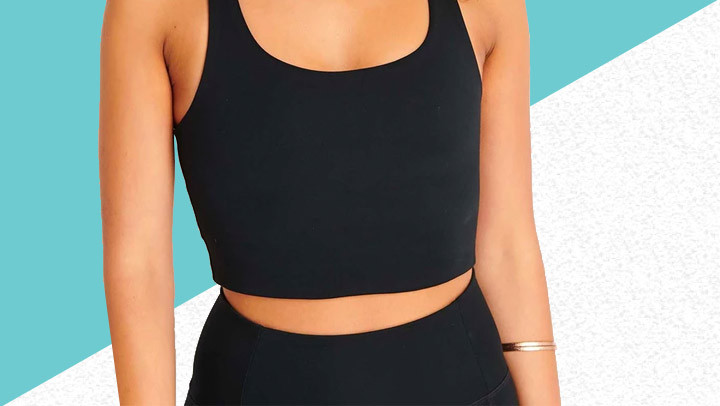
The Washington-based company Girlfriend Collective produce women’s activewear made from recycled single-use plastic bottles. It source the bottles from Taiwan, which is a world leader in recycling (they recycle a massive 55% of waste, compared to 45.7% in the UK and 35% in the US).
Girlfriend Collective uses these bottles to make polyester yarn to create its fabrics – and since PET, which is what most single-use bottles are made from, is a key component in this type of yarn regardless of whether it’s recycled or not, it makes total sense to opt for the sustainable method.
The company also use eco-friendly dye, which it ensures is strained of stray fibres and safe to reuse before releasing it back into the water system. Its factories are based in Denmark and Vietnam, with both paying a living wage above the local minimum and providing a free lunch to employees.
Importantly, it doesn’t use any forced or child labour, which is shockingly common in many fashion supply chains.
Buy: Its Paloma bra, which provides medium support and has a classic racerback design (£35), and the Compressive High Rise 7/8 Legging which has comfy four-way stretch material and a hidden pocket (£63).
Icebreaker
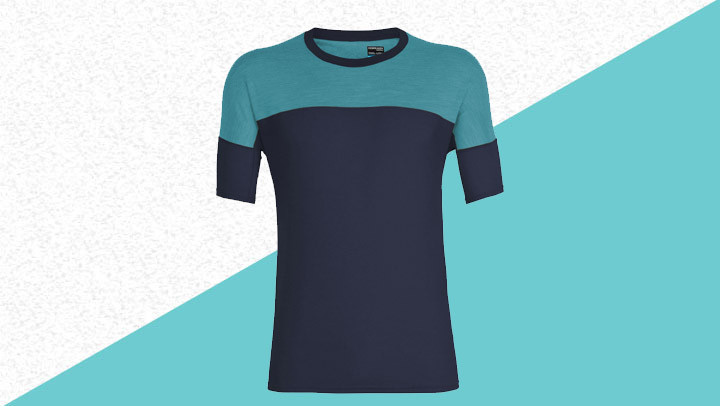
Hailing from Auckland in New Zealand, Icebreaker is a brand that’s had sustainability at its heart since its inception in 1995. Focusing heavily on the benefits of Merino wool and the technical features it offers, the brand has spent over two decades refining its products and processes to create environmentally-friendly kit that performs as well as if not better than synthetics.
The brand states that 85% of its global fabric is naturally produced, with the other 15% being man-made. The reason for this is due to the fact that there are certain elements of technical kit, like lycra in socks, that cannot be replicated effectively.
That is something that the brand is consistently trying to change, working on new technology to replace those man-made elements. in addition, the brand is focused on taking a circular economy approach to its packaging, aiming to use materials that can be safely returned to the soil or reused and recycled in closed loops, as well as implementing a return and recycle program by 2022.
One of the core themes of Icebreaker is to produce clothing that can be used for a long time for multiple purposes. Not only does that mean you can wear a t-shirt for a few days without needing to wash it due to the Merino fibres, but the aim is also to supply clothing that works across fitness/sport and daywear, so you don’t have a wardrobe full of products you occasionally use.
Buy: The Men’s Cool-lite Kinetica Short Sleeve Crewe (£70) and the Women’s Descender Long Sleeve Zip (£150)
Ohoy Swim
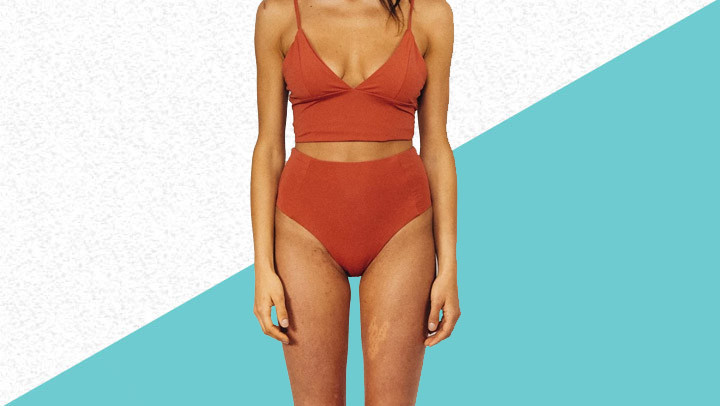
Founded by Scandinavian friends Henna and Anna, Ohoy Swim produces eco-friendly swimwear using 100% Econyl yarn. The yarn is made from discarded nylon collected from the sea – think abandoned fishing nets – and is said to lower the impact nylon has on the environment by 80% compared to oil-based nylon.
In addition to using sustainable materials, 1% of the company’s sales income goes towards supporting the recovery of fishing nets by volunteer divers. The swimwear pieces are made by a family-owned factory in Sri Lanka under fair working conditions too.
Ohoy Swim’s designs are simple and classic, which helps turn the tide against highly fashionable items which inevitably look dated within a few months. They’re also resistant to damage from chlorine and sun-screen to improve their longevity. This means people will be less tempted to replace them every year, instead investing in a reliable, chic swimming costume that will go the distance.
Buy: The simple but stylish Copenhagen one-piece ($105.76) or the long-line Marrakesh top and bottoms ($77.93 and $61.23 respectively).
Picture Organic Clothing
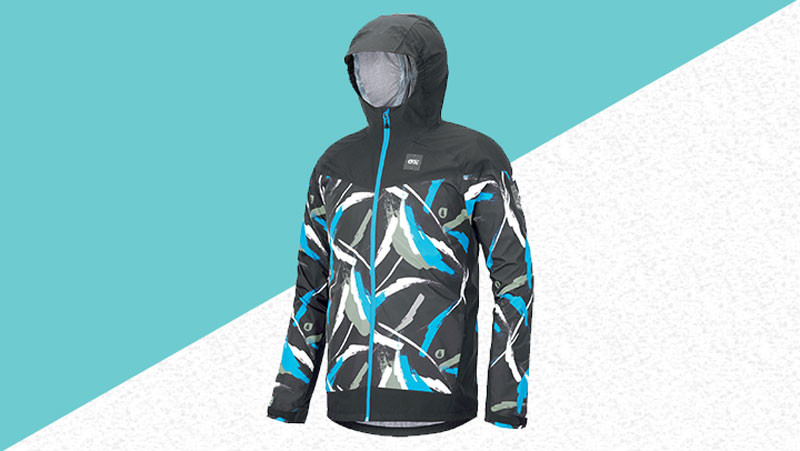
When you see the style of Picture’s range of outdoor kit it probably comes as no surprise that the company was founded by a group of keen snowboarders and skiers. However, since it started in 2008 the range of outdoorwear has grown to cover everything from winter sports and surfing to activewear and fashion.
Unlike the diverse range of products that have grown over the years, the brand’s focus on sustainability and climate change has been there since day one, offering one of the industry’s most transparent business strategies.
The mission to fight for climate control is something that underpins every aspect of the Picture model and includes, materials, durability, production and shipping. As well as being a Certified B Corporation and a member of the Fair Wear Foundation, the company has partnered with multiple projects and charities ranging from WWF to Riders For Refugees.
Materials used across every product incorporate organic, recycled, bio-sourced, reused and animal-based materials, and use PFC free water repellent treatments. The fact that it’s some of the nicest looking and most functional outdoorwear we’ve tested just goes to show why Picture is becoming so popular.
Buy: The Abstral Jacket (£149.99) and the Sampa running shorts (£47.95).
Manduka Yoga
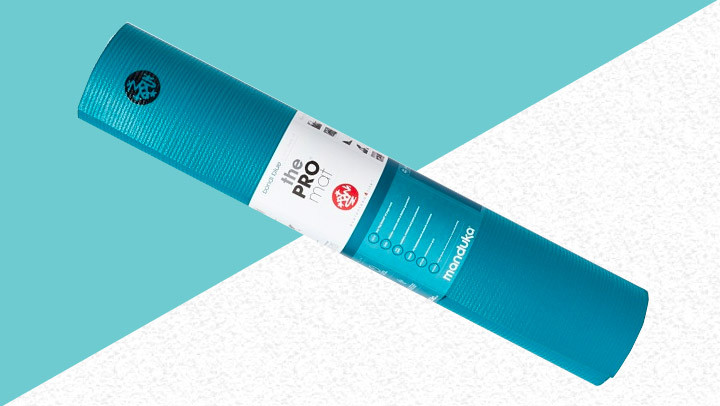
You may have seen Manduka Yoga‘s mats in your local yoga studio – they’re easy to spot thanks to the brand’s red and white frog logo. The company’s yoga accessory range is thoroughly environmentally conscious, with its popular PRO mats being manufactured emissions-free and the eKo mats produced with biodegradable rubber in a zero-waste process.
All its mats are toxic chemical, dye, and phthalate-free (a form of plasticiser which has been linked to health problems). When it comes to props, each item has its own unique environmentally-friendly factor. The bolsters are made with recycled plastic, the cushions are filled with organic buckwheat hulls and the blocks are made from recycled EVA foam or sustainable cork.
Buy: Its famous PRO mat ($11), which is non-slip and luxuriously thick, and the Enlight bolster ($56) which is rectangular for easy storage and comes in a striking tie-dye design.
Starseeds
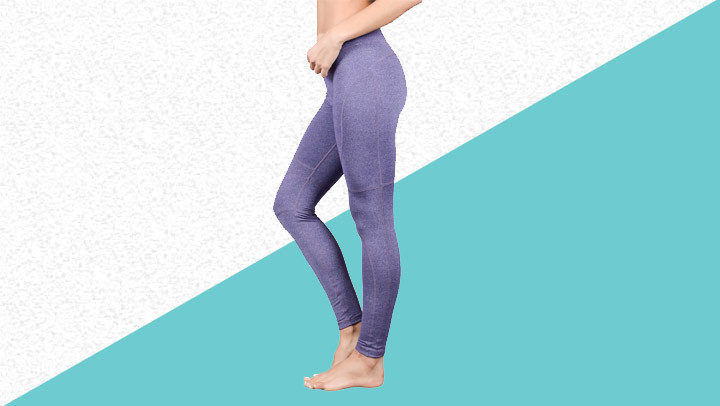
London-based brand Starseeds focuses on the ‘slow fashion’ movement – timeless, high-quality capsule collections of activewear that will last you for years. Its range is manufactured in Portugal and Eastern Europe, which limits the air miles the products rack up, and is put together with an array of recycled materials.
The innovative fabrics in its range are made from products like bamboo, organic cotton, linen and hemp, but perhaps the most impressive one is S Cafe: made with coffee grounds and recycled polyester. It sounds a bit wacky, but the fabric has all the performance factors of regular polyester, such as being lightweight and sweat-wicking, but is kinder to the environment, plus the coffee helps control odour.
Buy: The ultra lightweight Frappe shorts (£42), stylish Ristretto bra top (£36) and high-waisted Flat White leggings (£62). All eco-friendly, chic and incredibly well-named.
Asuno (UK only)
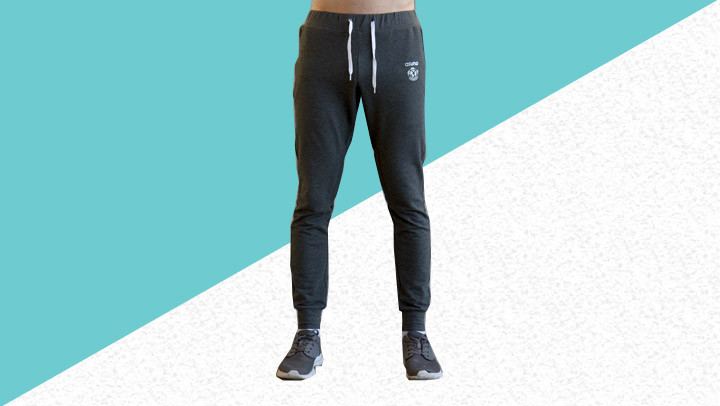
UK brand Asuno doesn’t just design great-looking activewear, it also donates to charities across Africa and Central America for every piece sold. Rather than giving vague claims about how much it donates, Asuno has a set donation it ties to each purchase with a different cause for each colour.
For pastel coloured clothing, it donates a number of ready-to-use therapeutic food sachets to a hunger charity, for deep coloured clothing it contributes towards the drilling of a new well, and for black clothing, it provides birth certificates for ‘invisible children’ – those without a legal identity.
If you’re someone who likes to know exactly where their money is going when you donate to charity, Asuno is the ideal brand to buy from.
Buy: The relaxed fit Revive bottoms (£34), ideal for yoga, and the high-waisted Inspire leggings (£42).
Sundried
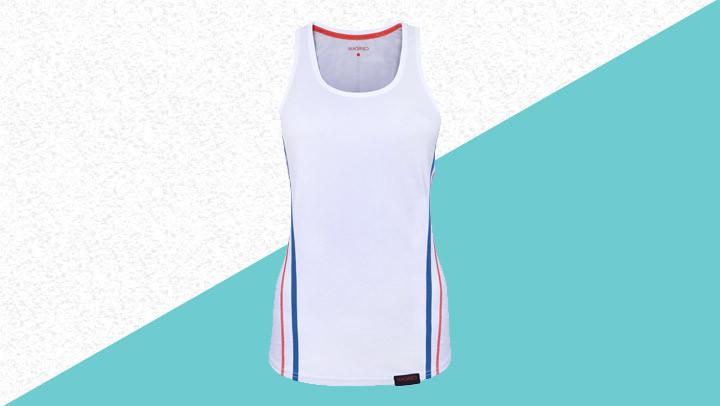
With ambassadors including Ironman champ Alice Hector and para-triathlete Tojo Lazzari, Sundried is a rapidly growing fitness brand. It produces a vast range of apparel including tri suits, cycling jerseys and gym accessories, but most impressive is its commitment to sustainable activewear.
Its Eco Core range features timeless, stylish clothing made from 100% recycled plastic bottles, complete with temperature control, UV protection, and odour prevention properties. The Eco Charge collection includes simple tops made using recycled coffee grounds for a quick-drying, sweat-wicking training outfit.
As well as committing to ethical and environmentally-friendly processes in its products, Sundried supports charities such as Water for Kids and Surfers Against Sewage.
Buy: The men’s Olperer t-shirt (£40) which works just as well for the pub as it does in the gym, and the women’s La Singla vest (£20) for a real running track throwback look.
People Tree
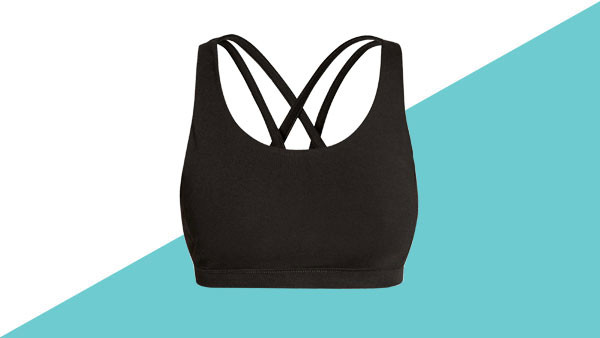
Established in 1991, you may well have heard of People Tree‘s ethical womenswear products. The first clothing company in the world to receive the World Fair Trade Organization’s Fair Trade product mark, People Tree has been bringing high-quality clothes with principles to us for several decades.
Now, it’s selling activewear too! Its products are made using natural, biodegradable materials as much as possible, and are sourced from socially responsible organisations and factories.
Buy: Luxe, loose-fitting Sasha trousers (£55) and the super-stylish cross back yoga top (£20). The top is made by Assisi Garments, a company which employs disabled and disadvantaged women in south India.
Vivobarefoot
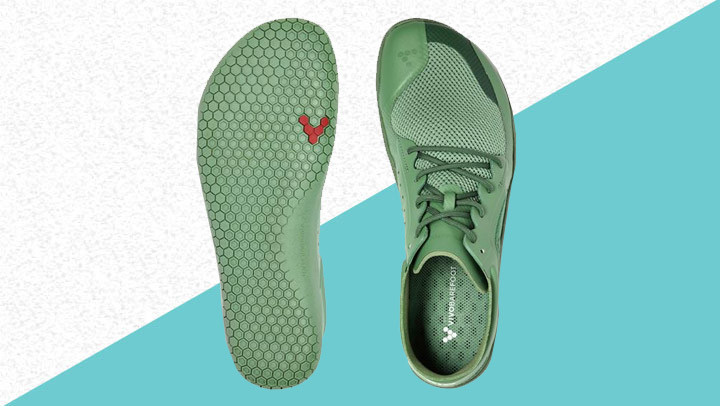
You may well already know Vivobarefoot, a company famous for its minimalist running shoes. It’s aiming to use 90% sustainable materials across its whole range by next year – no mean feat – and has already started to produce market-changing ethical footwear.
The Primus Lite Bio shoes are made using Susterra Propanediol. Yes, it sounds like something you’d find in shampoo, but it’s actually a byproduct of corn production that’s naturally non-toxic and petroleum-free. Both these and the Ultra Bloom shoes feature foam made from algae, which is super flexible as well as green (literally and metaphorically).
Both shoes are vegan, and the foams are much kinder on the planet than virgin plastics and foams often found in running shoes, so an innovation worth checking out.
Buy: The Primus Lite Bio (£120) and the Ultra Bloom (£75).
Adidas Parley
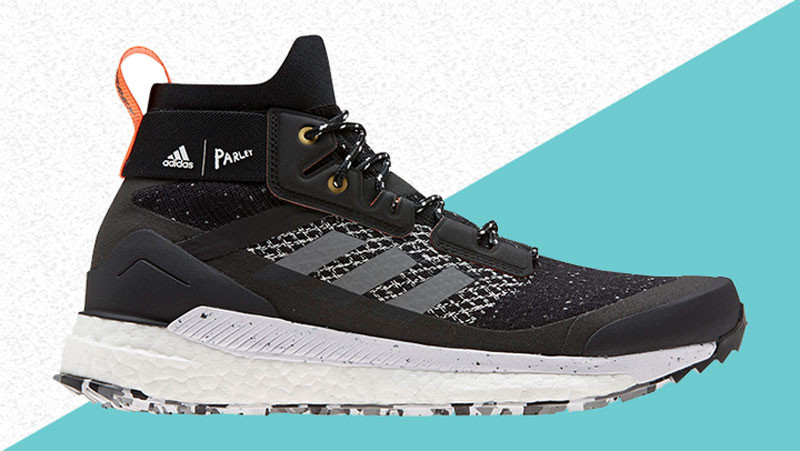
Adidas has been ahead of the game when it comes to sustainability in activewear and its mission to focus on using ending plastic waste began back in 2012. That concept saw the birth of a number of initiatives across the company, perhaps the most famous of which is the hugely popular Parley range.
Parley Ocean Plastic is created from upcycled marine plastic waste sourced from remote island and coastal communities. After being shredded and reworked into high-performance polyester yarn, it’s used to replace virgin plastics across the entirety of the Parley range. The company isn’t using 100% plastic waste in its products at the moment, but it aims to hit that mark by 2024.
Now the Parley range of products covers everything from hiking boots and highly technical running shoes to an enormous selection of apparel. The fact that the output offers some of the most aesthetically pleasing and functionally designed pieces of activewear you’ll come across today is a testament how brands can deliver great kit without harming the planet.
Buy: The Freehiker Paley Hiking Shoes (£169.95) and the Myshelter Parley Rain.Rdy Jacket (£199.95).


